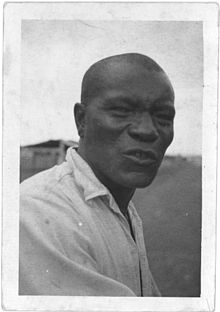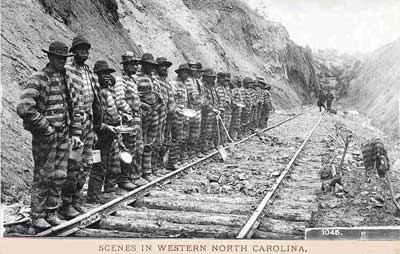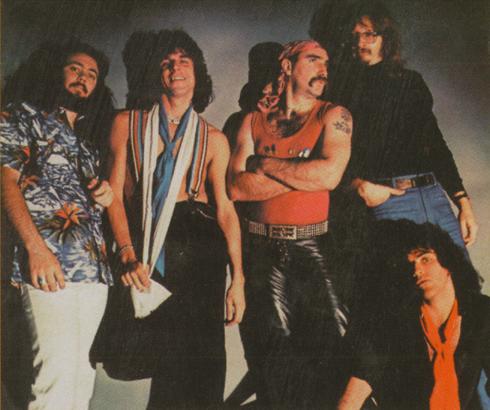Black Betty (bam-ba-lam)
Black Betty is a black belter according to every musician ever.
We are all familiar with the Ram Jam version of Black Betty. The party-rock song, whoa-O Black Betty, bam-ba-lam, whoa-O Black Betty. It’s a classic and we all love it whether we’re willing to admit it or not. But the song is a lot more classic than you might think. It’s incredibly classic, in fact, it pre-dates recording.
It’s often credited to Huddie Ledbetter, better known as ‘Lead Belly’, the fantastic blues musician from the 1930s and 40s. But in fact it appears to outdate Mr. Lead Belly by quite some time. His version called “Looky Looky Yonder/Black Betty/Yellow Women’s Doorbells” is a sort of medley, and it appears to be about a woman called Black Betty, who ends up pawning his clothes (that’s if the songs are linked). I say that because in different versions of the song ‘Black Betty’ refers to various different things: a prison wagon for transferring prisoners, a whip, a gun (a specific type of musket) and a bottle of whisky.
[youtube id=”-odWBO8EWjI” align=”center” autoplay=”no” maxwidth=”702"]
The song seems to have origins in the 18th century, long before Lead Belly was even thinking about being born. In 1736 Benjamin Franklin published a book called The Drinker’s Dictionary which lists 228 phrases for being drunk. Which in itself is amazing. One of his phrases is “He’s kiss’d black Betty’. This is where the bottle of whisky version of Black Betty would come into it. Certainly into the 19th century the phrase Black Betty seems to have been more in use. Lead Belly probably picked it up as a traditional folk song while he was imprisoned and working in a chain gang.

These early versions of Black Betty that we have recordings of are African-American work songs, so basically prison or slave songs that would have been sung by chain gangs. Not a gang of thugs whose weapon of choice was a chain. A chain gang was a long line of prisoners or slaves (innocent prisoners) chained together at the ankle all working on some sort of hard labour (train tracks, breaking rocks etc.). Generally one person would sing the lines and then the rest of the gang would accompany.
One recorded example is done very much in this style. James ‘Iron Head’ Baker leads the line with ‘Oh Lord Black Betty-‘ and the rest of the gang would accompany with ‘bam-ba-lam,’ and then back to ‘Iron Head’, ‘Oh Lordy Black Betty’. James ‘Iron Head’ Baker was in fact in prison. He was recorded and archived by John A. Lomax and his sons Alan and John Jr.. This was done with many very early blues musicians singing folk songs and prison songs (including Lead Belly) and the work was hugely important to the history of music, black culture, the Mississippi Delta and of course, rock and roll owes a lot to it.
[y[youtube id=”c4XFXJSQQOI” align=”center” autoplay=”no” maxwidth=”702"]p>
James Baker’s history is itself fascinating. His nickname ‘Iron Head’ is how he was known, but the name James Baker may just be a name the prison gave to him. He was a self-proclaimed habitual prisoner. When he recorded ‘Black Betty’ and other songs with the Lomaxes he was on his sixth term in prison, thirty-four years, and he was sixty-three years old. He had an incredible voice, and it was said that he knew so many songs that he never sang the same song twice. He knew his songs so well, was so knowledgeable that John Lomax referred to him as the ‘black Homer’.
Moses ‘Clear Rock’ Platt’s story is similar to Iron Head’s. Moses Platt was probably a prison name, and the nickname ‘Clear Rock’ was given to him for killing three people by throwing rocks at them. He also claimed to be a habitual prisoner. He spent forty-seven years in prisons in Texas. ‘Clear Rock’s’ version of Black Betty seems to be about whiskey. “Black Betty’s on the bottom, bam-ba-lam, Black Betty’s in the bottle”. In this recording it seems like he’s being reminded of the lyrics, probably by Lomax, “Black Betty had a baby,” he’s told and he promptly sings the line.
[you[youtube id=”BgvdA1MGCYo” align=”center” autoplay=”no” maxwidth=”702"]
While on a chain gang, singing was pretty much the only past time. And only form of pleasure if it’s the sort of think you’re into. And, as always, people want to sing about what’s going on in their lives. They want to express themselves and their hardships. But, if you’re a black slave or prisoner in the southern states between the 1700s and early 1900s you’re not going to be singing about what a dick the white owners were. And you’re not going to be singing about how you don’t like his whip. Why? Because that prick will whip you again. So you disguise what you’re singing about. You might not know the word ‘metaphor’ if you haven’t been educated, but you certainly know how to implement one. So that damn whip becomes, for example, ‘Black Betty’. And he cracks his whip BAM-BA-LAM. Perhaps it was a musket, the bam-ba-lam becomes the noise of the gunshot. The musket would have been a flint-lock musket with a black painted stock. The prison guards or soldiers were ‘hugging Black Betty’. And when a updated model of the gun came out, known as ‘Brown Bess’, with an unpainted wooden stock, it was seen as the ‘child’ of the flint-lock musket. Black Betty had a baby, bam-ba-lam. Damn thing went crazy. An interesting side note which is mostly unrelated: John A. Lomax married a woman called Bess Brown. Mad stuff.

One of the things I love about the song is how the lyrics change slightly in pretty much every single version. For example: the line above about the baby. In other versions you’ll hear, Black Betty had a child, bam-ba-lam. Damn thing went wild. They even begin to make the baby blind. More words, more rhymes. But this is good. This is what the blues is about, you take something that came before you and do your own thing with it. This is art. The artist makes it their own. Everything creative is informed by what preceded it, everything is an evolution, and Black Betty is a great example of the evolution of one small traditional folk song.
There doesn’t seem to have been a lot going on with Betty during the 50s and 60s. But there was something of a revival about to take place. By revival I mean the song was going to become an international hit, heard daily by more people than had heard it in the previous hundred or so years accumulated. But before Ram Jam got their hands on it Manfred Mann did just that in a live show. It’s not the modern rock Black Betty that is familiar to us, but you can clearly see (hear) the evolution in process, sprawling guitars etc.
[youtu[youtube id=”RXADwho06EM” align=”center” autoplay=”no” maxwidth=”702"]p>And even still, a year before Ram Jam could get their hands on it, a band called Starstruck did their cover of it. And now we have the modern rock song. We have the lyrics, that riff, the speed, the drums, it’s all there. Except one thing. It wasn’t a hit. This was 1976. In 1977 Ram Jam, including former Starstruck guitarist Bill Bartlett recorded their version of the song.
[youtube[youtube id=”I73T5EJmaS4" align=”center” autoplay=”no” maxwidth=”702"]Their version is basically the exact same as the Starstruck version, except slightly worse in my opinion, slightly more repetitive, despite being half the length. Radio friendly. But it had one important difference. It was a major hit. And since this version of the song, we now only really get this version. There’s little of the old blues number in it. I haven’t done the research on it, but I would wager that 200 million bands have covered it since Ram Jam, and each of them (bar one) has that same riff, they do it fast and loud. Gone are the days of Iron Head’s mellow acapella sing-a-long.

There are literally too many versions to go through them all. Even if you didn’t do a cover of it, you will get credited with one; ZZ Top, AC/DC and Lynyrd Skynyrd all have versions of Black Betty on Youtube, all of which are definitely Ram Jam. So, I’ll just leave you with what I consider to be the important attempts, or the ones that were hits. After Ram Jam there were a few remixes and dance versions of their hit. But the next heavy hitter to pick it up was none other than Nick Cave with his Bad Seeds, in 1986. Mr. Cave is a brilliant musician, we all know that, and he’s a blues appreciator and he’s the one musician who took the song up post Ram Jam and didn’t do the rock version with the guitar riff. Instead, because he’s endlessly classy, he did the Lead Belly version. The medley ‘Looky Looky Yonder/Black Betty/Yellow Woman’s Doorbell’. He just does it with slightly more attitude and gusto. Acapella. You gotta love Nick Cave.
[youtube id=[youtube id=”t22wGvzdi8g” align=”center” autoplay=”no” maxwidth=”702"]downhill from here I’m afraid.
Next we have the dreadful, glitzy, get-back-in-your-box-Dad, 2002, Tom Jones version. Which I’m not into.
[youtube id=�[youtube id=”RD8nNfUA8bc” align=”center” autoplay=”no” maxwidth=”702"]4 Spiderbait had a hit with a louder, faster, more aggressive version of Ram Jam. Plus they add some electro-banjo.
[youtube id=”n[youtube id=”nU1VfYYKMDk” align=”center” autoplay=”no” maxwidth=”702"]tloaf did a big-voice rock version in 2006. Joe Brown did a mandolin version. Soil did it. Ministry did it. Sheryl Crow did a version during which I’m surprised she managed to stay awake. She seems utterly bored while singing. The song means nothing to her, there’s no history to it. Though she does dance around during the musicy bits. Big City Rock did a version for the Teenage Mutant Ninja Turtles soundtrack. The Jon Spencer Blues Explosion have another loud version which is, disappointingly the rock version, not blues. The Melvins added little to it in 2011. And, it bothers me to say this, but the most different modern version comes from… ugh… this is difficult for me… Scooter (it is the most different version. Unfortunately that alone doesn’t make it good. In fact this is the worst version. Even if all the other ones with literally exactly the Ram Jam version, but with a slightly different singer voice, they’d still all be better than this nonsense.)
So, that’s it, videos below. Let us know which is your favourite version in the comments.
[youtube id=”tYK[youtube id=”tYKOKTFtc4A” align=”center” autoplay=”no” maxwidth=”702"]d=”VakVh[youtube id=”VakVh4RaJQ0" align=”center” autoplay=”no” maxwidth=”702"]”EpR4X5ORl[youtube id=”EpR4X5ORlSY” align=”center” autoplay=”no” maxwidth=”702"]ElHJTpbPPc[youtube id=”hElHJTpbPPc” align=”center” autoplay=”no” maxwidth=”702"]4O_fh0_E�[youtube id=”Kum4O_fh0_E” align=”center” autoplay=”no” maxwidth=”702"]uGYVsY” [youtube id=”GrinCuGYVsY” align=”center” autoplay=”no” maxwidth=”702"]tglQ” al[youtube id=”qE8ze6wtglQ” align=”center” autoplay=”no” maxwidth=”702"]hk” alig[youtube id=”dY-jYWxdohk” align=”center” autoplay=”no” maxwidth=”702"]d=”QaS6dJvkQ0M” align=[youtube id=”QaS6dJvkQ0M” align=”center” autoplay=”no” maxwidth=”702"], from a band called Fleetwood Mac (look them up). Used some of ‘Black Betty’ in his political song, ‘Murrow Turning Over in his Grave’. It’s a take off of Black Betty. Murrow turnin’ over, in his grave. MURrow turnin’ over, in his grave. Ed Murrow had a child, in his grave, the damn thing went wild, in his grave. It’s quite good, wait for the guitar solo.
[youtube id=”mNxdW88EaFc” align=�[youtube id=”mNxdW88EaFc” align=”center” autoplay=”no” maxwidth=”702"]t." href="http://www.headstuff.org/2014/06/jack-white-goodnight/" target="_blank" rel="noopener">Jack White belts into one Black Betty chorus during a live performance of Screwdriver with his band The White Stripes.
[youtube id=”KPZloMBit00″ align=”c[youtube id=”KPZloMBit00" align=”center” autoplay=”no” maxwidth=”702"]g/wiki/Lead_Belly" target="_blank" rel="noopener">Featured Image Source

